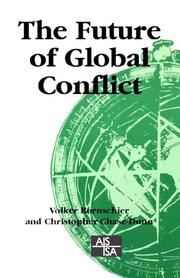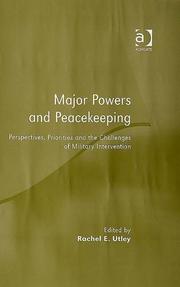| Listing 1 - 10 of 59 | << page >> |
Sort by
|
Book
ISBN: 1315843994 1317893549 9781317893547 1317893530 Year: 2014 Publisher: Hoboken Taylor and Francis
Abstract | Keywords | Export | Availability | Bookmark
 Loading...
Loading...Choose an application
- Reference Manager
- EndNote
- RefWorks (Direct export to RefWorks)
The Birth of a Great Power System, 1740-1815 examines a key development in modern European history: the origins and emergence of a competitive state system.H.M. Scott demonstrates how the well-known and dramatic events of these decades - the emergence of Russia and Prussia; the three partitions of Poland; the continuing retreat of the Ottoman Empire; the unprecedented territorial expansion of Revolutionary and Napoleonic France, halted by the final defeat of Napoleon - were part of a wider process that created the modern great power system, dominated by Europe's five leading states.Enhanced by
Great powers --- Powers, Great --- Super powers --- Superpowers --- World politics --- History --- Europe --- Politics and government
Book
ISBN: 0875866654 9780875866659 0875866638 9780875866635 0875866646 9780875866642 9780875866635 9780875866642 Year: 2008 Publisher: New York Algora Pub.
Abstract | Keywords | Export | Availability | Bookmark
 Loading...
Loading...Choose an application
- Reference Manager
- EndNote
- RefWorks (Direct export to RefWorks)
Imperialism --- Great powers --- Powers, Great --- Super powers --- Superpowers --- World politics --- History --- United States --- Foreign relations --- Territorial expansion. --- Military policy. --- Annexations

ISBN: 1446218163 1848609078 1283880652 0585352887 9780585352886 0761958657 9780761958659 0761958665 9780761958666 9781446218167 9781848609075 9781283880657 Year: 1999 Publisher: London Thousand Oaks, Calif. Sage Publications
Abstract | Keywords | Export | Availability | Bookmark
 Loading...
Loading...Choose an application
- Reference Manager
- EndNote
- RefWorks (Direct export to RefWorks)
In this critical analysis of long-term trends and recent developments in world systems the contributors' works include comprehensive discussion of the economic, political and military role of the Pacific Rim, former Soviet Union and Japan.
World politics --- Great powers. --- Twenty-first century --- Powers, Great --- Super powers --- Superpowers --- World politics - 1989 --- -Great powers. --- Twenty-first century - Forecasts
Book
ISBN: 1108110215 1108105440 0511997663 1107011957 1107676169 9780511997662 9781107011953 9781107676169 Year: 2017 Publisher: Cambridge Cambridge University Press
Abstract | Keywords | Export | Availability | Bookmark
 Loading...
Loading...Choose an application
- Reference Manager
- EndNote
- RefWorks (Direct export to RefWorks)
The Japanese experience of war from the late-nineteenth to the mid-twentieth century presents a stunning example of the meteoric rise and shattering fall of a great power. As Japan modernized and became the one non-European great power, its leaders concluded that an empire on the Asian mainland required the containment of Russia. Japan won the First Sino-Japanese War (1894-5) and the Russo-Japanese War (1904-5) but became overextended in the Second Sino-Japanese War (1931-45), which escalated, with profound consequences, into World War II. A combination of incomplete institution building, an increasingly lethal international environment, a skewed balance between civil and military authority, and a misunderstanding of geopolitics explains these divergent outcomes. This analytical survey examines themes including the development of Japanese institutions, diversity of opinion within the government, domestic politics, Japanese foreign policy and China's anti-Japanese responses. It is an essential guide for those interested in history, politics and international relations.
Strategy --- Great powers --- Political culture --- Imperialism --- Culture --- Political science --- Powers, Great --- Super powers --- Superpowers --- World politics --- History. --- Japan --- History, Military --- Military policy. --- Foreign relations
Book
ISBN: 0197646670 0197646654 0197646662 Year: 2023 Publisher: New York, NY Oxford University Press
Abstract | Keywords | Export | Availability | Bookmark
 Loading...
Loading...Choose an application
- Reference Manager
- EndNote
- RefWorks (Direct export to RefWorks)
How do great countries stay that way? The United States is the most powerful actor in the international system, but it is facing a set of challenges that might lead to its decline as this century unfolds. This book looks to the past for guidance, examining the grand strategy of previous superpowers to see how they maintained, or failed to maintain, their status. Over the course of six cases, from ancient Rome to the British Empire, it seeks guidance from the past for present U.S. policymakers. How did previous empires, regional hegemons, or simply dominant powers forge grand strategy? How did they define their interests, and then assemble the tools to address them? What did they do right, and where did they err? What-if anything-can current U.S. strategists learn from the experience of earlier superpowers?
U.S. foreign policy --- grand strategy --- Strategy --- Great powers --- History. --- Powers, Great --- Super powers --- Superpowers --- World politics --- Military strategy --- Military art and science --- Military doctrine

ISBN: 0582217172 9780582217171 9781315843995 9781317893523 9781317893530 9781138134232 Year: 2006 Publisher: London ; New York ; Tokyo...[et al.] Pearson Longman
Abstract | Keywords | Export | Availability | Bookmark
 Loading...
Loading...Choose an application
- Reference Manager
- EndNote
- RefWorks (Direct export to RefWorks)
940.2 --- Geschiedenis van Europa: Nieuwe en Nieuwste Tijd--(1492-heden) --- 940.2 Geschiedenis van Europa: Nieuwe en Nieuwste Tijd--(1492-heden) --- Great powers --- Powers, Great --- Super powers --- Superpowers --- World politics --- History --- Europe --- Politics and government
Book
ISBN: 9781107005419 9781107659186 9780511793967 9781139549288 1139549286 1139554247 9781139554244 0511793960 9781139551786 1139551787 1107005418 1107659183 1316089312 9781316089316 1139564102 9781139564106 1139555499 9781139555494 1283741334 9781283741330 1139550535 9781139550536 Year: 2012 Volume: 123 Publisher: Cambridge New York Cambridge University Press
Abstract | Keywords | Export | Availability | Bookmark
 Loading...
Loading...Choose an application
- Reference Manager
- EndNote
- RefWorks (Direct export to RefWorks)
Do great leaders make history? Or are they compelled to act by historical circumstance? This debate has remained unresolved since Thomas Carlyle and Karl Marx framed it in the mid-nineteenth century, yet implicit answers inform our policies and our views of history. In this book, Professor Bear F. Braumoeller argues persuasively that both perspectives are correct: leaders shape the main material and ideological forces of history that subsequently constrain and compel them. His studies of the Congress of Vienna, the interwar period, and the end of the Cold War illustrate this dynamic, and the data he marshals provide systematic evidence that leaders both shape and are constrained by the structure of the international system.
Great powers --- International relations --- Philosophy --- History --- Great powers. --- Political science --- Philosophy. --- History. --- International Relations --- General. --- Diplomatic history --- International history (Diplomatic history) --- World history --- Powers, Great --- Super powers --- Superpowers --- World politics --- Social Sciences --- Political Science --- International relations - Philosophy --- International relations - History

ISBN: 0754640337 Year: 2006 Publisher: Aldershot Ashgate
Abstract | Keywords | Export | Availability | Bookmark
 Loading...
Loading...Choose an application
- Reference Manager
- EndNote
- RefWorks (Direct export to RefWorks)
856.1 Conflictpreventie --- 856.5 Humanitaire interventies --- 856.6 Vredesopbouw --- Great powers --- Peacekeeping forces --- Peacekeeping (Military science) --- Peacekeeping operations --- Armed Forces --- International police --- Peace-building --- Powers, Great --- Super powers --- Superpowers --- World politics
Book
ISBN: 9781501702341 1501702343 9781501704017 150170401X 9781501704000 1501704001 Year: 2016 Publisher: Ithaca
Abstract | Keywords | Export | Availability | Bookmark
 Loading...
Loading...Choose an application
- Reference Manager
- EndNote
- RefWorks (Direct export to RefWorks)
The relationship between established powers and emerging powers is one of the most important topics in world politics. Nevertheless, few studies have investigated how the leading state in the international system responds to rising powers in peripheral regions-actors that are not yet and might never become great powers but that are still increasing their strength, extending their influence, and trying to reorder their corner of the world. In the Hegemon's Shadow fills this gap. Evan Braden Montgomery draws on different strands of realist theory to develop a novel framework that explains why leading states have accommodated some rising regional powers but opposed others. Montgomery examines the interaction between two factors: the type of local order that a leading state prefers and the type of local power shift that appears to be taking place. The first captures a leading state's main interest in a peripheral region and serves as the baseline for its evaluation of any changes in the status quo. Would the leading state like to see a balance of power rather than a preponderance of power, does it favor primacy over parity instead, or is it impartial between these alternatives? The second indicates how a local power shift is likely to unfold. In particular, which regional order is an emerging power trying to create and does a leading state expect it to succeed? Montgomery tests his arguments by analyzing Great Britain's efforts to manage the rise of Egypt, the Confederacy, and Japan during the nineteenth century and the United States' efforts to manage the emergence of India and Iraq during the twentieth century.
Hegemony --- Great powers --- Foreign relations --- History --- Hegemony. --- Powers, Great --- Super powers --- Superpowers --- World politics --- Hegemonism --- Political science --- Sociology --- Unipolarity (International relations) --- Foreign relations. --- Great powers - Foreign relations --- Great powers - History - 19th century --- Great powers - History - 20th century
Book
ISBN: 9781107660113 9781139526210 1139526219 9781283574785 1283574780 9781139136808 1139136801 9781139528603 1139528602 9781107022522 1107022525 1139540203 9781139540209 1107231779 9781107231771 9786613887238 6613887234 1139532073 9781139532075 1139530887 9781139530880 113952741X 1107660114 Year: 2012 Publisher: Cambridge Cambridge University Press
Abstract | Keywords | Export | Availability | Bookmark
 Loading...
Loading...Choose an application
- Reference Manager
- EndNote
- RefWorks (Direct export to RefWorks)
The years between the World Wars represent an era of broken balances: the retreat of the United States from global geopolitics, the weakening of Great Britain and France, Russian isolation following the 1917 Bolshevik Revolution, the resurgence of German power in Europe, and the rise of Japan in East Asia. All these factors complicated great-power politics. This book brings together historians and political scientists to revisit the conventional wisdom on the grand strategies pursued between the World Wars, drawing on theoretical innovations and new primary sources. The contributors suggest that all the great powers pursued policies that, while in retrospect suboptimal, represented conscious, rational attempts to secure their national interests under conditions of extreme uncertainty and intense domestic and international political, economic, and strategic constraints.
Balance of power --- Great powers --- Strategic culture --- Culture --- Military policy --- National security --- Powers, Great --- Super powers --- Superpowers --- World politics --- Power, Balance of --- Power politics --- International relations --- Political realism --- History --- Social Sciences --- Political Science
| Listing 1 - 10 of 59 | << page >> |
Sort by
|

 Search
Search Feedback
Feedback About UniCat
About UniCat  Help
Help News
News